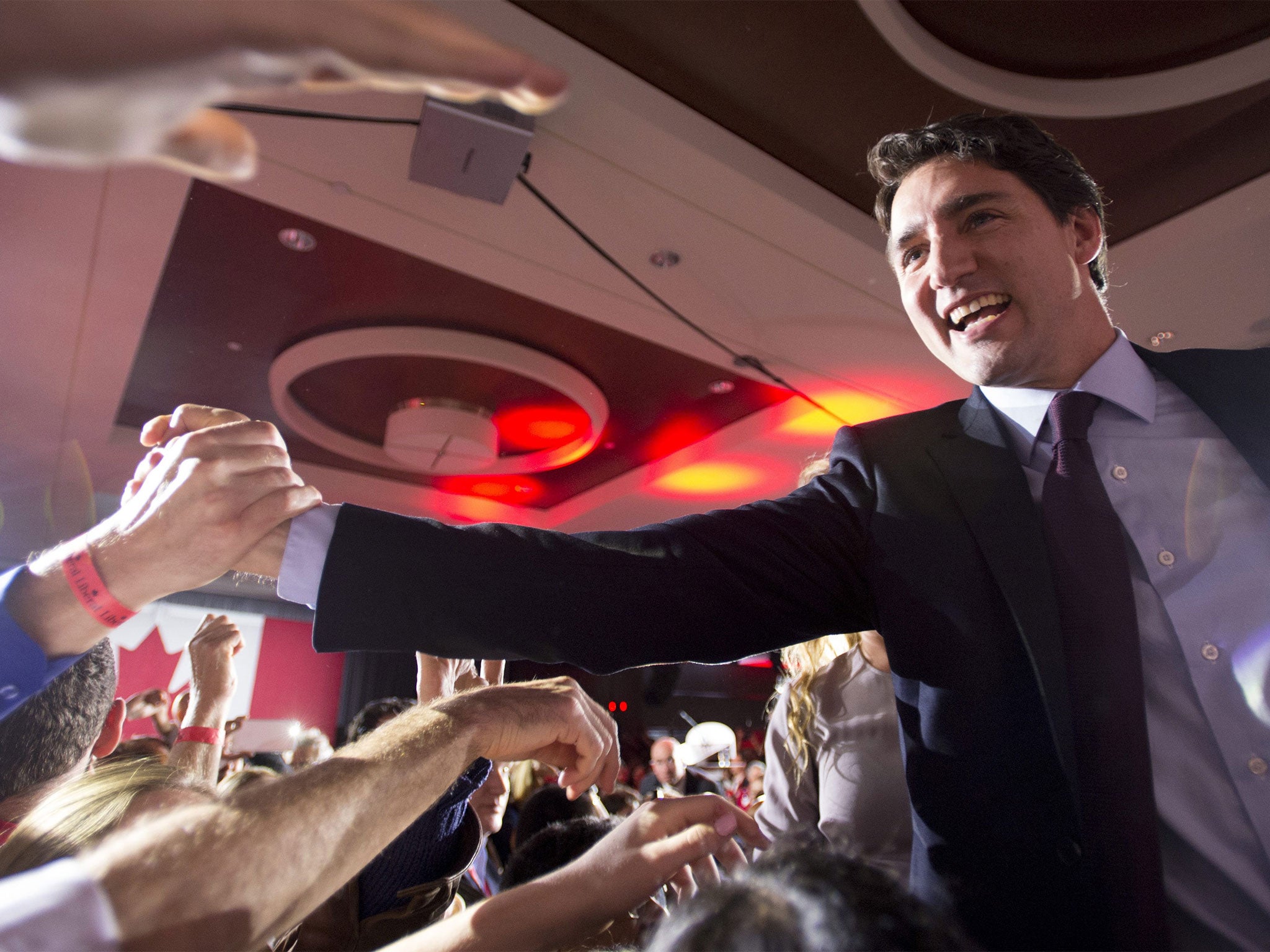Justin Trudeau’s handsome victory could set the tone for Jeremy Corbyn
Over the next four years Canada has the chance to become a test bed for key parts of what Corbyn represents


His opponents said he lacked experience, and he spent most of the long campaign in third place. But he criss-crossed the country with a passion, offered a positive message of change to enthusiastic crowds of new, young voters, and sprinted to a convincing majority.
Not Jeremy Corbyn, but Justin Trudeau, leader for the past three years of Canada’s languishing Liberal Party – and now the country’s Prime Minister-elect.
The parallels do not stop there. Their programmes for government have much in common, starting with an unashamed advocacy of the sort of leftwing policies that many believed had been consigned to the dustbin of history. They include higher taxes for the better-off to pay for lower taxes for others and improved benefits. They envisage allowing the public finances to go into deficit to fund capital investment. They both promise more generosity towards refugees, more emphasis on the environment, and in foreign policy a more critical approach to relations with the United States, first and foremost on military intervention.
There are glaring differences between the two men, of course, starting with the obvious age gap. Corbyn is 66; Trudeau is 43, young looking and glamorous with it. Nor could anyone accuse the latter of lacking rhetorical skills or charisma. His victory speech was not quite of the “ask not what your country can do for you” calibre, but it was aspirational in a way that chimed with particular Canadian sensitivities.
Soundbites from the speech have been doing the rounds on social media, but just give these a read to catch the flavour: “We defeated the idea that Canadians should be satisfied with less; that good enough is good enough and that better just isn’t possible. This is Canada, and better is always possible”; “Canada is a country strong, not in spite of our differences, but because of them”; “If Canadians are to trust their government, their government needs to trust Canadians.” Corbyn clearly has work to do in the oratory department.
And while Trudeau may lack personal experience of government – he was elected an MP for the first time in 2008, after 15 years as a drama teacher, and became party leader only in 2013 – he grew up steeped in politics and will be returning to live in the Prime Ministerial residence where he spent his childhood, the eldest son of a former Prime Minister, the late Pierre Trudeau.
It must also be added that a general election victory is of a rather different order from being elected leader of a despondent British Labour Party. Then again, Trudeau was elected party leader by a landslide at a time when the Liberal Party had suffered three crushing election defeats in a row under leaders who were accident-prone (Stephane Dion), or esteemed but ill-suited (Michael Ignatieff). The turnaround that Trudeau has accomplished (taking the Liberal Party he inherited with its lowest number of parliamentary seats ever to an overall majority this week) will be studied by political theorists for years to come.
Some will doubtless be tempted to go further, and discern a common trend in the unexpected victories of Trudeau and Corbyn an ocean apart. Is this the start of a popular global backlash against sound money policies, otherwise known as “austerity”? Has the tide of foreign military intervention been reversed? Could the old-style European left be the coming thing?
Such a conclusion goes too far. Canada suffered less from the financial crisis than many other countries, in part thanks to the efforts of Mark Carney at the country’s central bank, whose record recommended him to George Osborne for the Bank of England. I don’t hold with the New Labour consensus that Ed Miliband’s Labour Party lost the UK election because it moved too far to the left. But if British voters moved anywhere in 2015, it was slightly to the right. And the international picture is mixed.
The French Socialist government has been forced somewhat to the right by the joint pressures of economic reality and a high-riding National Front. Of those industrialised countries that have held recent elections, Greece is the poster child for a leftward lurch, while those electorates with concerns about security or migrants (Israel, Finland, Estonia – and next week, probably, Poland) either stayed with, or moved towards, the right. So there may be an international trend towards an old-fashioned left agenda, or there may not. But the Canadian result offers something else more interesting and potentially as significant, at least for Britain.
With his unpredicted overall majority, Trudeau has a chance to carry out his promises, and his positive and purposeful campaign suggests that he has the will to get things done. Canada over the next four years thus has the chance to become a test bed for at least some of what Jeremy Corbyn represents.
One of Trudeau’s first acts was to announce an end to the participation of Canadian air force jets in anti-Isis strikes over Iraq and Syria. His view is that there are more effective, non-military ways to counter Islamic State. Corbyn may not have converted his parliamentary party, or even his shadow Defence Minister, to his brand of unilateralism, but the aversion of grassroots voters – not just Labour ones – to new military intervention after the failures in Afghanistan, Iraq and Libya could well endure. Not even Russia’s military action in Syria seems to have whetted the British public’s appetite to join in.
The crucial test, though, will be economic policy. To the extent that the next Canadian government manages to use credit wisely, to the benefit of the many and not the few, it will offer Corbyn’s Labour Party the model it has craved.
Of course, Trudeau may not succeed. But if, in four years’ time, he has shown that a modern economy can be managed with less pain than George Osborne insists, the arguments at the next UK election could sound very different – whether or not Jeremy Corbyn is still at Labour’s helm.
Join our commenting forum
Join thought-provoking conversations, follow other Independent readers and see their replies
Comments
Bookmark popover
Removed from bookmarks